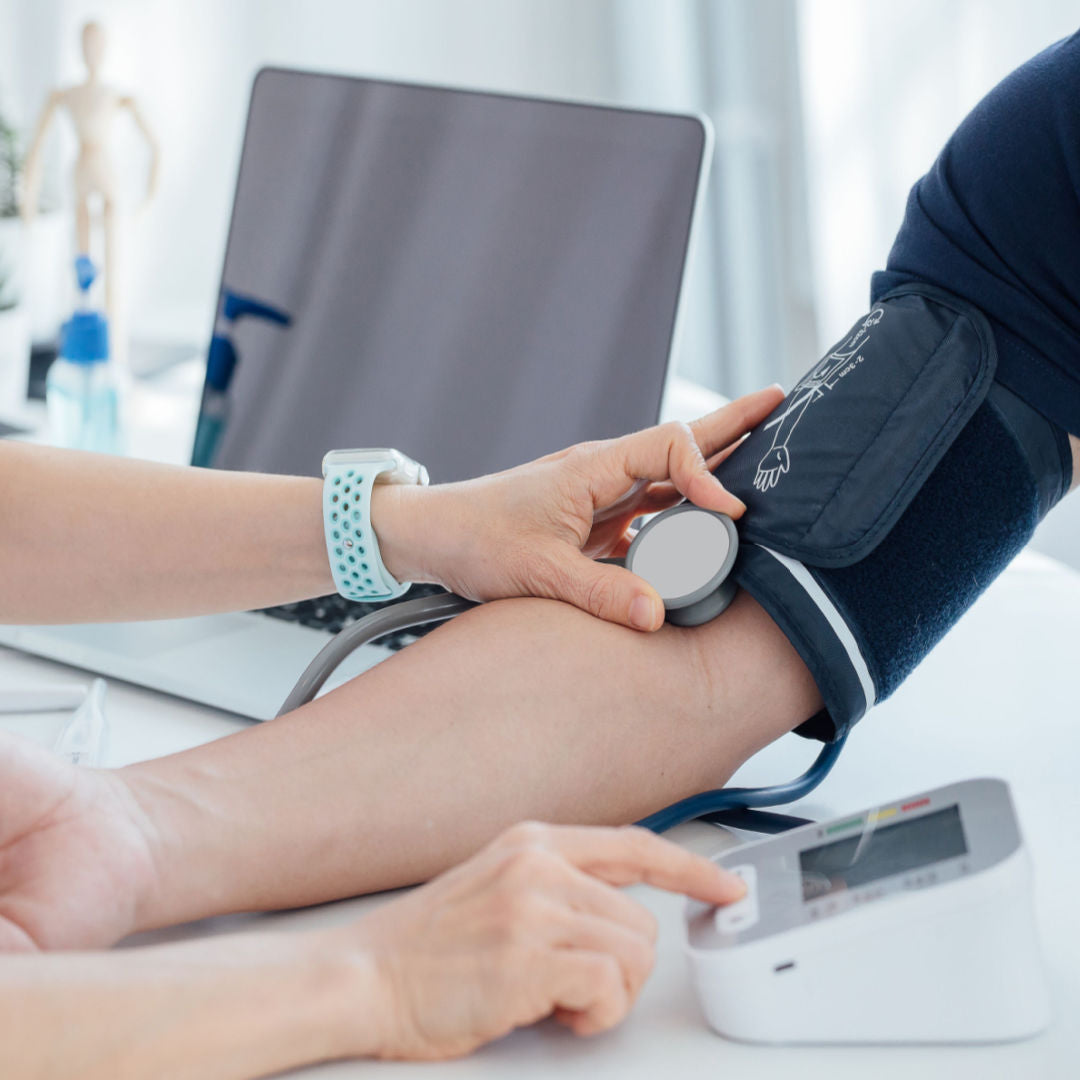
How to Maintain good blood pressure?
Share
Keeping good blood pressure is essential for a healthy and happy life. Yet, half the American adults live with hypertension or high blood pressure.1 This article explains what blood pressure is, the consequences of having high blood pressure, and how to control your blood pressure to stay healthy.
What is blood pressure?
Blood pressure is the force your heart pushes against your artery walls. With each heartbeat, your heart pumps blood into your arteries.2
Blood pressure is highest when your heart beats, pumping the blood. This is your systolic pressure. When the heart is at rest, blood pressure lowers. This is your diastolic pressure.2
How do you measure blood pressure?
Healthcare professionals measure blood pressure in millimeters of mercury (mmHg). They typically use a gauge, a stethoscope or electronic sensor, and a blood pressure cuff to determine systolic and diastolic pressure.2,3
For instance, if your blood pressure is "130 over 80" or 130/80mmHg, it means you have a systolic pressure of 130mmHg and a diastolic pressure of 80mmHg.3
In general:3
- Ideal blood pressure is between 90/60mmHg and 120/80mmHg.
- High blood pressure is ≥ 140/90mmHg.
- Low blood pressure is ≤ 90/60mmHg.
The healthcare provider will make two or more readings at separate time points to make a diagnosis.2
High blood pressure often has no symptoms; a few people report headaches, shortness of breath, or nosebleeds. But these symptoms are not specific and may not appear until blood pressure reaches dangerous levels.4 So, regular blood pressure checks are the only way to find out.2
Types of high blood pressure
High blood pressure can be primary, developing over time as you age. It can also be secondary when associated with another medical condition or treatment.2
Secondary high blood pressure usually resolves after you treat the disease or stop taking the medications that are causing it.2
Why worry about high blood pressure?
When your blood pressure stays high for too long, it causes your heart to pump and work harder. The possible consequences are: 2,4
- Heart attack
- Stroke
- Heart failure
- Kidney failure
- Aneurysm
- Dementia
- Trouble with memory or understanding
- Vision loss
So, keeping your blood pressure under control is essential.2

Treatment
The treatment involves lifestyle modifications and medicines to control or lower your high blood pressure.2
As we discussed, if you have secondary high blood pressure, treating that disease or stopping the medicines will help relieve the problem.2
How do you control your high blood pressure?
You can control your blood pressure by maintaining healthy lifestyle habits. See a few examples below:4,5,6
- Eat a healthy diet – eat a variety of low-fat foods, fresh fruits and vegetables, and whole grains.
- Practice regular physical activity – exercise helps you keep a healthy weight and lower blood pressure. Aim for at least 2:30 h of moderate-intensity training per week.
- Keeping a healthy weight – it can help control high blood pressure and reduce the risk of cardiovascular complications.
- Limiting alcohol intake – too much alcohol raises blood pressure and adds calories, contributing to weight gain.
- Quitting smoking – cigarette smoking raises blood pressure and the risk of heart diseases. If you smoke tobacco, talk to a healthcare provider to help you quit.
- Managing stress – controlling stress can improve your mood and lower your blood pressure. Techniques to reduce stress include meditation, yoga, listening to calming music, or exercising.
- Reducing sodium intake – too much sodium can cause your body to retain fluid, increasing blood pressure.
- Increase potassium intake – this nutrient helps balance the amount of sodium in cells.
- Getting a good night’s sleep – treating sleep problems such as sleep apnea and getting good quality sleep can help lower high blood pressure.
In summary
High blood pressure is a common health problem in the United States and worldwide. The disease can be silent, so doing regular checkups is vital.
Your doctor will recommend the best treatment, but simple lifestyle changes can help you control your high blood pressure. So, why don’t you start now?
References:
- High blood pressure. CDC, 2021. Available: https://www.cdc.gov/bloodpressure/facts.htm#:~:text=Nearly%20half%20of%20adults%20in,are%20taking%20medication%20for%20hypertension. Access: 06/09/2022.
- High Blood Pressure. Medline Plus, 2020. Available: https://medlineplus.gov/highbloodpressure.html. Access: 06/09/2022.
- What is blood pressure? NHS, 2019. Available: https://www.nhs.uk/common-health-questions/lifestyle/what-is-blood-pressure/. Access: 06/09/2022.
- High blood pressure (hypertension). Mayo Clinic, 2021. Available: https://www.mayoclinic.org/diseases-conditions/high-blood-pressure/symptoms-causes/syc-20373410. Access: 06/09/2022.
- How to Prevent High Blood Pressure. Medline Plus, 2020. Available: https://medlineplus.gov/howtopreventhighbloodpressure.html. Access: 06/09/2022.
- High Blood Pressure and Older Adults. NIH, 2021. Available: https://www.nia.nih.gov/health/high-blood-pressure-and-older-adults. Access: 06/09/2022.